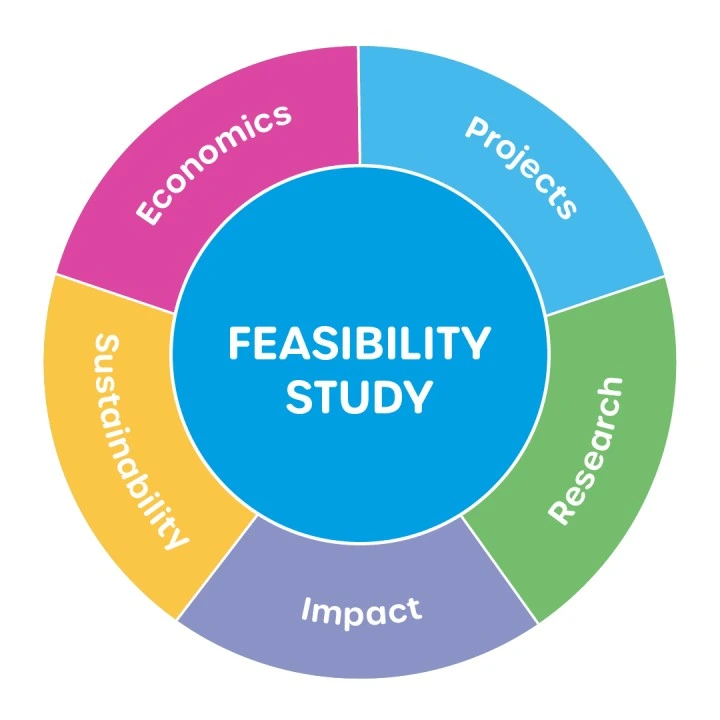Feasibility analysis is the process of confirming that a strategy, plan or design is possible and makes sense. This can be used to validate assumptions, constraints, decisions, approaches and business cases.
Technology is not an essential element of innovation but it often plays a key role in facilitating change. Economist Joseph Schumpeter suggested that Entrepreneurs use technological innovation to get strategic advantage and for a while this allows them a lot of money. It usually follows a period of market stability and the innovation will cause substantial disruption.
Project Feasibility analysis or Study
A feasibility study is an analysis that takes all of a project’s relevant factors into account—including economic, technical, legal, and scheduling considerations—to ascertain the likelihood of completing the project successfully.

Project Feasibility analysis is carried out to ensure viability of project. The important project feasibility study is given below:-
1. Market Feasibility
Market feasibility is concerned with two aspects the aggregate demand for the proposed product/service, the market share of the project under consideration.
For this market analysis requires variety of information and appropriate forecasting methods. The kind of information required is
- Consumption trends in the past and the present consumption level
- Past and present supply position
- Production possibilities and constraints
- Imports and exports
- Structure of competition
- Cost structure
- Elasticity of demand
- Consumer behavior, intentions, motivations, attitudes, preferences, and requirements
- Distribution channels
- Administrative, technical and legal constraints
2. Technical Analysis
Technical Analysis seeks to determine whether prerequisites for successful commissioning of the project have been considered and reasonably good choices have been made with respect to location, size, and so on.
The Important questions raised in technical analysis are :-
- Has the availability if raw material, power and other inputs been established ?
- Is the selected scale of operation optimal ?
- Is the production process chosen suitable ?
- Are the equipment and machines chosen appropriate ?
- Have the auxiliary equipment and supplementary engineering works been provided for ?
- Has Provision been made for treatment of effluents ?
- Is the proposed layout of the site, buildings and plant sounds ?
- Have work schedules been drawn up realistically ?
- Is the technology proposed to be employed appropriate from the social point of view ?
3. Financial Analysis
Financial Analysis is necessary as ascertain whether the propose project is financially viable in the sense of being able to meet the burden of servicing dept and whether the purpose project will satisfy the return expectations of those who provide the capital.
The aspects to be looked into while conducting financial appraisal are as follows.
- Investment outlay and cost of project
- Means of financing.
- Project profitability
- Break-even point
- Cash shows of the project
- Investment worthiness judged in terms of various criteria of merit
- Project financial position
- Level of risk
4. Economic/Social Cost benefit Analysis
This is concerned with judging a project from the larger point of view, where is the focus if on social costs and benefits of a project, which may often be different from its monitory costs of benefit .
This questions to be answered in social cost-benefit analysis are as follows.
- What are the direct economic benefits and costs of the project measured in terms of efficiency prices and not in terms of market prices ?
- What would be the impact of the project on the distribution of income in the society ?
- What would be the impact of the project on the level of savings and investment in the society ?
- What would be the contribution of the project towards the fulfillment of certain like self-sufficiency, employment and social order ?
5. Ecological Analysis
Today, Environmental concerns assured a great deal of significance and hence ecological analysis should be done, particulars for project which have significant ecological implications like power plants and irrigation schemes and for environmental polluting industries like chemicals, leather processing etc.
The Key questions to be answered in ecological analysis are as follows.
- What is the likely damage caused by the project to the environment ?
- What is the cost of restoration measures required to ensure that the damage to the environment is contained within acceptable ?
Conclusion
At last words, A Feasibility analysis is an assessment of the practicality of a proposed project or system. In its simplest terms, the two criteria to judge feasibility are cost required and value to be attained. Generally, feasibility studies precede technical development and project implementation. A feasibility study evaluates the project’s potential for success; therefore, perceived objectivity is an important factor in the credibility of the study for potential investors and lending institutions.












